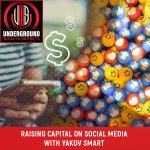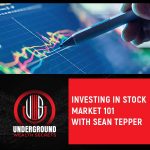Navy Vet Creates 7-Figure Wholesaling Business With Vance Courtney
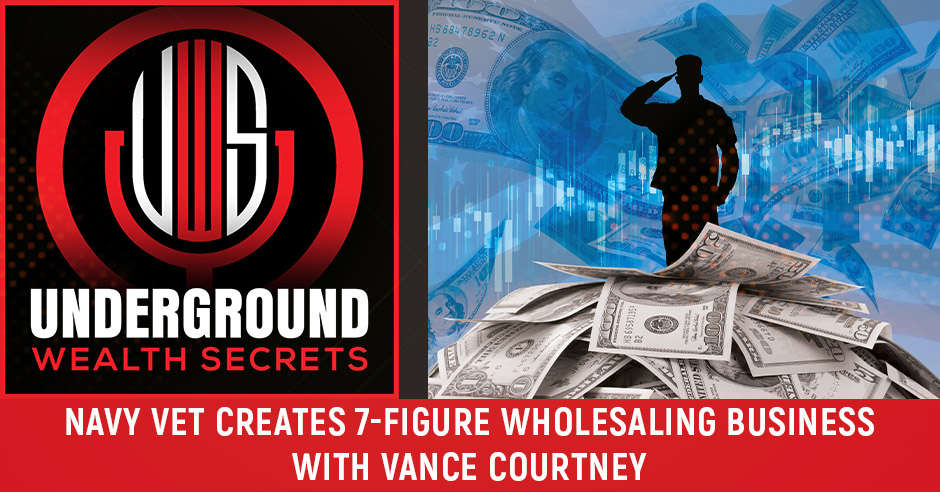
The key to creating a 7-figure wholesaling business is to go out there and take action. Educate yourself on your market and focus on that. Invest in yourself. If you don’t know how to sell, spend your money on a sales program. If you don’t know how to sell, you can’t get deals in the first place. Learn how to generate those leads and consistently follow up on them. Once you do all of these things, then your business is set.
Join Julie Houston as she talks to a former military vet who has a 7-figure wholesaling business out of Augusta, GA, Vance Courtney. Discover how Vance invested in himself so that he could get to where he is today. Start taking action so you can scale your business today.
Links:
undergroundwealthsecrets.net/Scaling
undergroundwealthsecrets.net/freecourse
undergroundwealthsecrets.net/facebookpage
undergroundwealthsecrets.net/diamondlawcenter
undergroundwealthsecrets.net/Youtube
—
Watch the episode here
Listen to the podcast here
Navy Vet Creates 7-Figure Wholesaling Business With Vance Courtney
We have a fellow Navy veteran in the house, so I’m excited about that as I am a Navy veteran as well. We have Vance Courtney with us. Vance, welcome to the show.
I thank you so much, Julie, for having me here. I appreciate it.
It’s such a pleasure to have you. Why don’t you tell our readers a little bit about yourself?
I’m a real estate investor wholesaler based out of Augusta, Georgia. We’ve been doing this for several years. I have a consulting company that helps people scale their businesses. I have a wholesaling business that does about 100 plus deals a year, which is 7 figures. Also, I work less than ten hours a week in the business. It’s awesome. I love helping other people do that exact same thing. Prior to that, I was a software systems engineer that was focused on building systems, putting teams behind it, and helping them deploy that in the organization.
You started several years ago.
In 2018, it was a classic, “I picked up a bad investment.” It was like, “This is not how I want to do this. I don’t want to keep losing money. How do I find out how to get these good deals?” When I realized that once I got a good deal, I was like, “This is a repeatable process.” It’s almost built like a system to me. If I have to do something three or more times, I’m going to find a way to automate that and then put a system behind it. When I realized it was a big system, I didn’t focus on finding the deals for myself. I found the deals for the other investors and grew from there. We put a team into play and the systems and processes to back it up. Now I get to have the opportunity of cherry-picking the deals as they come through. I got a great machine and a great team that works with us.
That’s everyone’s dream, cherry-picking the deals. How did you even get into real estate, coming from your background?
I’ve always had a slight interest in real estate. I joined the military and went through the bootcamp. One of the chiefs there made a comment saying, “You’re going to get a retirement from the military, but if you want two retirements, live in your home and keep it every few years when you have to move, and you’ll get this portfolio.” I’m like, “That’s awesome. I’m nineteen years old. This is great.”
I’ve been doing that since about 2008. As soon as I moved in, I picked up a home, and every few years, I’ve been keeping it. Around 2018 or so, I was like, “This is going to take way too long. I want to do this faster.” That’s what led to, “Can I have my retirement?” That’s plan A, but let me do plan B. As you get into understanding a little bit about real estate, you realize that plan A isn’t as great as plan B. Let’s switch those around now. We went full in on the real estate side.
Would it be safe to say this person influenced your real estate? There’s a mindset a little bit and opened your vision to a bigger picture.
It did. It wasn’t necessarily the slowest way, but it was still one of the best ways because it allowed me to build the assets slowly that have given me the leverage a little bit now. This is the first time meeting this chief who had an impact for at least always holding it and creating that second retirement. The big classic that I got to give a big attribution to as to why I wanted to accelerate that thought process was reading the book the classic Rich Dad Poor Dad.
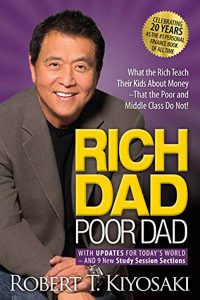
I am understanding the difference between asset liability, and I’m sitting there like, “I need more assets.” That’s what led down to try to find my own deal. I live in a good market, Augusta, Georgia. It’s great for rentals, but I was like, “Don’t invest in your backyard. Let me go into a great market. I went into Detroit not knowing anything, buying a home turnkey. Long story short, I picked it up. It was cashflowing day one. It was cashflowing $900 a month. We paid $70,000 for it. Those are decent numbers. A week later, after we picked it up, the tenant was in place, moved, the place got flooded, got robbed, and had to get it boarded up. I didn’t live there, so I’d never even seen it.
Foundation had an issue, and I’m like, “Great.” I had to sell it at a discount to a fellow investor at $40,000 after putting some money into it. It was a $40,000 loss. I’m like, “How do I not do that ever again?” Some people would knock them out of the game, but it was more about, “How do we avoid this? Turnkey was not so turnkey.” That’s the gist of that one. It was my first loss, and then it was to get them deep enough and in my own backyard.
Now, are you staying in your own backyard?
That’s exactly it. As a matter of fact, we haven’t even finished tapping our own market. We’re still adding new marketing methods and channels. That ties into one of the big secrets of scaling. Hyper-focus on one market and channel until you dominate it, then add another. Don’t even look at another market until you dominate your current one. We’re too busy trying to look around. I was too busy looking at where the best place was, not realizing I had a great place right where I’m at.
Tell me a little bit more about how it works.
From the real estate side, as a wholesaling company, we have three major dials that we’re focused on. The first one, you got to crank it up. It’s called marketing. This marketing could be cold calling, direct mail, or anything in between. As long as you turn the marketing on and you’re doing a channel, pick one and dominate it, then you got to get your sales skills turned up. The next knob is the ability to talk to sellers and get the deal closed. As the saying goes in real estate, your money is made on the buy, not the sell. It’s about that purchase.
The final third dial that we focus on is also known as disposition, as they say in our industry, but it’s the operation. It’s the fulfillment. It’s getting what you said you were going to get done to the finish line. A lot of times, I’ll see people focus a lot on marketing or the operation, never hitting the sales, picking up that phone, talking to the seller, or going on appointments. That phone can be 500 pounds sometimes. They don’t want to pick that thing up. We help focus on each major operation.
You got to dial in each of those three concepts.
That’s pretty much it because the biggest thing is to get your marketing turned on. We can talk about the different strategies, like how sales work. The most important thing when you’re doing this is you’re going to be doing it all starting off and again, focusing on the one channel. The two popular ones that I personally like are direct mail and cold calling. I use a simple question, “Do you have more time, or do you have more money?” If you have more time, pick up the phone and do that cold calling because that’s a muscle memory-type activity. It takes a lot of time to get out there. If you have more money than time, invest in direct mail and have the calls come to you. You’ll be surprised at how many people will pay for direct mail, and the calls come in, but they don’t pick up.
Don’t wait. Do a live answer. People wait for it to go to voicemail and say, “I’ll get it when I get off work. I’ll get to it later.” In the meantime, that person is pulling multiple postcards, and the first person who answers will get the chance to close that deal. The big focus that we work on is making sure your marketing is tuned in, you’re generating leads, and you are getting quality leads, and then we go into the sales process. It gets super dialed in, but people will hear things and be, “I want to go drive for dollars.” You drive around neighborhoods looking for ugly homes, or they’re like, “I want to go put out bandit signs.”
That’s how I started driving for dollars.
Pick it up. Driving for dollars is a great way to get started, but focus on it. Don’t drive for dollars for half an hour here, and then put a bandit sign and send a couple of letters you hand-wrote. When you do a little bit of everything, you’re not going to get anywhere. Put all the same energy, money, and time into one thing and do it well. Drive, call it, and you will get deals. As soon as you get that first deal, then you invest money back into the marketing. That way, your business starts funding itself immediately after your first revenue activity. You don’t have to keep putting money into a business. Your business should be an ATM machine. I put $1 in, and I should get $3 out. I should operate nice. It shouldn’t be I put $5 in and get $1 out later. That’s bad business. I wouldn’t want to do that.
When you do a little bit of everything, you're not going to get anywhere. Put all your energy into one thing and do it really well. Click To TweetThat’s terrible. What are some of your biggest learning curves when you started compared to where you are now that you would share with someone? It’s the thing you didn’t know and had to learn otherwise.
I’ll hit it on each major section here. Hitting with marketing, it comes back to going big and consistent. When I talk to people about marketing, don’t dabble. Be committed when you’re doing this. I say go broke with marketing. Spend everything you have. I don’t care what it is. Sell your TV so you can put your time into it. I don’t care. Get the leads to come in because that’s the money-making activity right there. Your next part is to get the deal. Talk to the sellers. Don’t delay. If you don’t have sales experience, spend a little bit of money and get that sales training. There are some big industry names that are out there that you can leverage, like John Martinez, Steve Trang, and Sandler Method.
I don’t care which sales method. Pick one, master it, and apply it. Put the money back into yourself to get to close, and then you’ll focus on the ability to disposition or sell it. If you want to hold it, flip it, be a real estate investor, or wholesale it, you’ll spend your time there. What a lot of people are doing is they’re trying to master the craft when it’s like, “Get out there and fail forward.” Know that failure is part of the path to success.
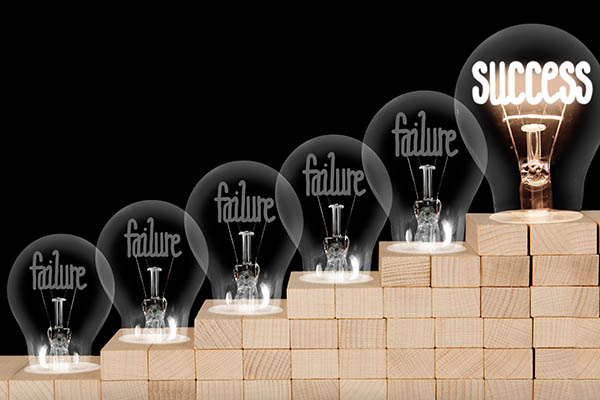
Don’t let the first no stop you. In my mind, this is how we look at it. I had to get through 100 noes to get to 1 yes. It’s all through repetition. That’s a number thing. Consistently every single day, putting that work in. I will give one tip when it comes to sales. Here’s a little secret sauce to sales. Seventy percent of our deals come from follow-up. Most salespeople know this, but your average touch takes twelve touches to be able to close to the sale. The average salesperson will do three touches before they quit.
They’ll call twice, they don’t pick up a couple of times, they’re done, and they move on to the next lead. To get the sale, that’s what you want to shoot for. You want to be above that. We always say that the money’s in the database. That’s because 70% of your deals will come from follow-up. If you’re waiting for them to pick up, and they’re calling motivated and want it to be a laydown, you’re looking at 10% to 20% follow-ups. Everything else is through follow-up. That’s the name of the game, and the one who follows up the most will win.
Here’s what I can promise you. Not one person we ever called said, “We were following up too much.” Nobody complains about being followed up on too much. What I can tell you is that we’ve lost deals from not following up enough. I already give that secret sauce. Be consistent every day and persistent and follow up with what the lead. You spent the money on it. Don’t be, “They’re not ready now. It’s a no right now.” Keep following up.
That’s the key in any business too. It applies to anything. You have to have consistency and continually follow up in order to even move forward.
Here’s a cool thing. If you put the money into the training on sales, here’s the secret thing about sales. It’s not even about sales. It’s truly talking about persuasion. It’s not in a manipulative way. I use this example so people can understand. I’m not going to be able to convert a Christian to an atheist or an atheist to a Christian. You cannot persuade somebody. I can’t persuade somebody like you to sell your house for a massive discount. If they don’t need it, you’re going to use the realtor 99% of the time. All I’m doing is using persuasion to get them to a yes or a no. They already know the answer. I’m just trying to persuade them to give me that answer. I need to go through 99 noes to get to a yes.
The worst answer, and one I’ll never accept, is a, “Maybe. Let me think about it.” Those are the ones that I avoid. A lot of times, they’re scared because you didn’t give them permission to say no. People don’t want to hurt your feelings. This applies to anything. If you’re talking for clients, selling, or you’re at a car dealership, the, “Let me think about it,” is simply because you never gave them permission to tell you no. Even afterward, it should be, “I get that.”
You want to do a pull-away technique. At this point, there are a little bit more techniques you can use, but one would be, “I’m sorry. I feel like a real jerk here. I get super excited about real estate. Sometimes I get the feeling that now may not be the best time. If it’s not, it’s no problem. Tell me no, and I promise you won’t hurt my feelings. At least I’ll get a no or a yes.” They think about it sometimes like, “No, it’s not that. I need to think about this,” or they’ll elaborate.
Now, you’re getting to the real problem, or they’ll tell you no, and it was a nice way of saying no. The worst is a maybe, and then you go to follow up with them. They keep ghosting you and not following up because they don’t want to tell you no. Maybes are the worst. Get a no so you can at least put them out of the system and move forward or at least follow up with them months later, not tomorrow and the next day, and keep hitting them, and you’re texting and all of that.
Stay away from the maybes. I like that you also say invest in yourself. In the sales course, that’s a big key too. Getting out of your comfort zone and investing in yourself is one of the components of being more successful.
As a matter of fact, this is the order of investments that I would always do if I had money. If you have money, believe it or not, don’t put it into real estate first. That’s going to sound contradictory. Pick up a home if you’re going to buy a personal home and keep moving. That’s different. If you’re going to buy an investment, why would I put any of my own money into a deal looking for a 10%, 15%, or 20% return when I can first put it into a business that will give you a 3X to 5X return? That’s 300% to 500%, not 20%. Even better, especially if you believe in yourself, you get an almost infinite but 100X return when I put it here.
If you have money, don't put it into real estate first. Put it into a sales program and start investing in yourself. Click To TweetYou can spend $500, $1,000, or even $5,000 on the sales program. You got a skill that can never be taken away. No matter what market or industry you’re in, you’ll never lose that skill. It’s a forever skill. It’s got an infinite return when you invest in yourself. Step 1) I always believe in investing in yourself. Step 2) Invest in your business, and what you’re producing, your effort before you invest in an asset. This goes against the norms, but I am against the norm personality.
People think like, “Ninety percent of millionaires are made with real estate.” Here’s what I believe about wealth. I believe wealth is built through businesses but preserved through real estate. I don’t ever hear about how people are like, “I flip all these homes.” Flipping a home is not holding it. Flipping a home produces income, and that was a business. You then took the money and put it into a rental.
If you go and buy a rental with no equity and you’re trying to play cashflow for $100 a month, do you know how many rentals you need to have in order to finally cashflow your lifestyle? What you did is you paid down your debt or bought a good deal through some form of effort through a business of some form that brought the revenue. I believe that when it comes to wholesaling and flipping, those are businesses. The product is real estate, but it’s transactional.
I believe that even in general, having passive income, regardless of where you’re building it up, is also one of those things not all investors solely do real estate, and that’s why they’re where they’re at. There are maybe other contributing factors, and I’ve learned that from some of the wealthiest people I’ve ever met. One thing, they have passive income, and they don’t put all their eggs in one basket.
I agree with that. My own breakout is roughly similar to that, where 50% for me is heavy into real estate, but I still have some money in the stocks. I still have some money invested into some gold and then even cryptocurrency, which is a small portion. It’s having diversification in your own investments, but that’s all tomorrow’s money not needed for now. It builds until you get to where it exceeds your expenses. You can reinvest it. I’m 100% with you on that. There’s not one that fits all. Use your expertise if you’re great with stocks and business. A business is an asset too. People don’t realize that it has value. It can grow the network. You can borrow against a business if it’s producing. To me, all asset classes are valuable.
I got to ask. Who is probably the most influential person in your life or has influenced or impacted your life the most in general?
I have to give it to him. This was an older coach of mine. His name is Tom Krol. He impacted me because he’s the one that helped me with the very first, doing wholesaling at the beginning. More importantly, he gave me some great books. One of them was called The Four Spiritual Laws of Prosperity. When he made the comment that every wealthy person’s ever read it, I was like, “I’m going to read that,” and it was eye-opening. The Four Spiritual Laws of Prosperity by Edwene Gaines is fantastic. It was great and life-changing. We talked about the four principles and how I apply it.
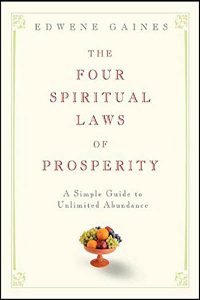
I haven’t read that.
It’s a different book. It’s good and fantastic. I recommend it to anybody.
I’m going to have to check it out.
That’s awesome. It will be good.
I love it. I got to ask this. How’s your business in the market and the economy now? Do you see a change or difference? Are you still as good as ever?
There’s a change, but that’s our job, especially as business owners. Every industry has shifts and changes. The question is how you survive through it. Luckily, we started before COVID. When COVID hit, we had to adapt and change. After COVID, we’re still going through and during the changing market. Here’s the secret about real estate. It comes back to the buy. It means you have to get it deeper and bring awareness and education to the seller. It is having an impact, but I also got to find other ways to monetize it on the opportunity.
As far as revenue and our deal flow, it’s the same as in 2021. It comes down to what you are doing if the same tricks don’t necessarily still work now to stay abreast. I’m a big fan of masterminds and groups because that’s where high-level other entrepreneurs and investors can share and collaborate. Anytime you get to be a part of a mastermind or a group of people that are on the same trajectory and path that you’re on, it’s super important because you can see what’s going on. Everybody comes up with different techniques, and we’re applying them before they become popular in the industry.
In regards to scaling a business, let’s say you’re out there already doing a few deals. This applies to any business. When you’re a service-based industry, when it comes to scaling, if you’re doing it all yourself, I can’t recommend this enough. If you haven’t had a chance, get yourself a virtual assistant. Get a virtual assistant if you don’t have one. Here’s the reason. I don’t even care if you have a high-income job. If you’re working six figures and don’t have an assistant, you are doing stuff at $5 an hour because you could be paying somebody else to do it. I always make the joke, “You do realize that without an assistant, you are sometimes working at the McDonald’s wage. They might even be making more than you.”
“What are you talking about?” We start talking about some of the things like, “How many forms are you preparing or phone calls and scheduling of appointments are you doing? If you’re doing that and somebody else can do it at $5, and you’re not paying somebody, that means you’re doing it, and you value yourself there.” When we start talking about the $1 per hour, doing breakouts, and time studies with them, it opens up their eyes and like, “I need to stop doing this. I need to be doing this $500-an-hour activity, not the $5.
That could change somebody’s business overnight. What do you think are the keys to success in the kingdom for you? I know you created the system and the processes. When did that impact your business? When did you incorporate and share it?
When I started sharing the process, the system’s been a couple of years now. I’ve been doing it, sharing it, helping others, and implementing these different tools and processes. The biggest impact you can have is helping somebody go from a solopreneur where they feel they got a business because they got a cool logo and a business card, but they don’t have any people. What they’ve created is a high-income job. That’s fantastic if that’s what you want.
If you got in this to have leverage and have a business, it’s challenging. I’m not saying it’s impossible. If you’re in a sales role and there are certain exemptions, it’s hard to go to seven figures by yourself. You have to be extremely good at whatever that activity is. It’s a rarity, not common. The fastest way to grow to get to seven figures is through the leverage of people. That’s what I will focus on. It is bringing on people to your team to help you grow.
If you get a chance, I’m going to help you out. I got two exercises I’d like for you to do. Here’s the first one. It’s real simple. Over the next few days, I want you to write down. It’s called a Love It Hate It Exercise. I want you to write down everything that you love, and I want you to write down everything that you hate that you’re doing. If you don’t have a love or hate, I put it in my Meh Column. Who cares? It’s worth it, but I love it, and I hate it. Once you’ve identified that, you’ve already identified what you’re looking for as far as hate.
The next thing I’d like for you to do is for the next three days, you’re going to hate this, but do this. If you take this step, you’ll get some phenomenal results. For the next three days, starting tomorrow morning, every fifteen minutes, set a watch, a clock, or a timer. You’re going to write down what you’re doing. Here’s what’s going to happen at the end of three days. You’re not going to write down that you Netflix and chilled. You want to be, “I was on Facebook for 30 minutes or 1 hour.” You’re not going to want to write all these things down. You’re going to be, in those three days, more productive than you’ve ever been before. Step one, you’re going to get an instant productivity boost in the hack. The next thing you’re going to realize is everything that you’re doing, sit there and assess like, “Who could do this? Am I the only one that can do this?” You’re coordinating and scheduling.
This is where you’re going to find out what you’re doing and how much of what you love versus hate. If it’s on the list and it’s a low-value activity, meaning you assess it and put it to the Hate It, that is your new job description to hire out. That’s a hack on, “Who do I hire next?” You hate it and realize it’s a low-paying activity, so you outsource it. You’ll be surprised at how many people think they’re super productive, but they’re busy when they look at all the things they’re doing. They spent 2 hours doing this and 30 minutes managing email. You got to get somebody else to help you out. The first hire for any high-income earner or any solopreneur is an assistant.
That’s good feedback.
Take that step. Try it. Do it. That’s what I do at home. Your audience will take that action and jot it down and do it.
For our readers, Vance is going to share some of the information that we reviewed now. That will be available at UndergroundWealthSecrets.net/Scaling. Do you have any closing words you’d like to tell our audience before we close?
There’s a couple. Be on the other side of comfort. If you’re comfortable now and don’t like where you’re at, get uncomfortable. Get that next thing where you know what you need to do, but you’re scared of it. Whatever you’re scared of doing, do it. If you want massive growth, be on the other side of comfort because that’s where success comes from. Do it scared, get out there, and take massive imperfect action. Don’t wait for the perfect plan.
Be on the other side of comfort. If you're comfortable right now and you don't like where you're at, get uncomfortable. Click To TweetI like that. Thank you so much, Vance. It’s been such a pleasure having you on the show.
Thank you so much. I appreciate it. If there’s anything else I can do, let me know. Thanks again for having me.
Thanks for being with us. It was our pleasure.
Important Links
- UndergroundWealthSecrets.net/Scaling
- UndergroundWealthSecrets.net/FreeCourse
- UndergroundWealthSecrets.net/FacebookPage
- UndergroundWealthSecrets.net/DiamondLawCenter
- UndergroundWealthSecrets.net/YouTube
About Vance Courtney
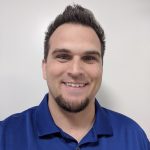 VANCE COURTNEY is a former military vet who has a wholesaling business out of Augusta, GA with his beautiful wife and business partner Jackie Courtney. As a former systems/software engineer he leverages his experience with systems, automation, and technology in his real estate business.
VANCE COURTNEY is a former military vet who has a wholesaling business out of Augusta, GA with his beautiful wife and business partner Jackie Courtney. As a former systems/software engineer he leverages his experience with systems, automation, and technology in his real estate business.
Systematizing and streamlining processes for efficiency is his niche. His expertise has been applied in the Department of Defense, Industrial Control Agencies, the National Security Agency, real estate, and now in the education space. His newest venture is helping to transform solo-preneurs from the hustle & grind to entrepreneurs as business owners through the implementation of efficient systems, effective leadership, and exceptional culture. Vance provides a business operating system framework, tools, and processes for an overall systems implementation for others self implement.



